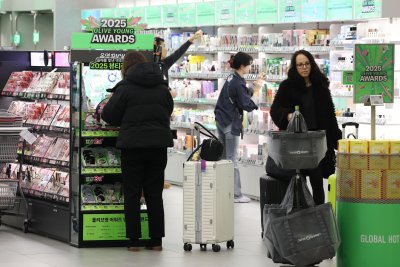Overseas online sales of S. Korean products reach record high in 2025

Online sales of South Korean products in overseas markets rose to a record high in 2025, government data showed Monday. In this December photo, foreign tourists shop at an Olive Young outlet in Incheon International Airport. File Photo by Yonhap
Online sales of South Korean products in overseas markets rose for the third consecutive year to a record high in 2025, government data showed Monday.
Outbound online sales by South Korean businesses reached 3.02 trillion won (US$2.09 billion) last year, up 16.4 percent from a year earlier, according to the data from the Ministry of Data and Statistics. The figure has been on a steady increase since 2023.
By region, sales increased by 26.3 percent on-year in the United States and 10.9 percent in China, while sales to the 10 member countries of the Association of Southeast Asian Nations (ASEAN) fell 4.4 percent.
By product category, food and beverage sales surged 49.2 percent to 112.9 billion won, the highest level since the statistical standards were revised in 2017.
Sales of cosmetics rose 20.4 percent, while those of albums, videos and musical instruments increased 7 percent.
Copyright (c) Yonhap News Agency prohibits its content from being redistributed or reprinted without consent, and forbids the content from being learned and used by artificial intelligence systems.
